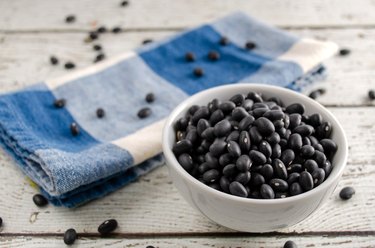
Whether dried beans are a new staple in your pantry or a long-time favorite, you're probably aware of (or have experienced first-hand) the more musical side effects of this healthy legume.
But beans are very nutrient-dense — and the fact that they can bring about gas shouldn't prevent you from eating them.
Video of the Day
Video of the Day
In fact, beans offer many of the same vitamins and minerals you usually get from vegetables, but they are also a good source of protein without the fat and cholesterol found in many animal-based foods, Bonnie Taub-Dix, RDN, author of Read It Before You Eat It: Taking You from Label to Table, tells us.
Why Do Beans Cause Gas?
Notably, beans are high in fiber (providing about 6 to 8 grams per half-cup cooked), which is a crucial but tough-to-digest nutrient, Taub-Dix says.
In an effort to break down the fiber in beans, your body may produce some gas as it works to digest it.
But it's not just the fiber: Beans cause gas due to their oligosaccharide content. Specifically, it's the raffinose, a type of oligosaccharide, that causes post-meal music.
Oligosaccharides, a component of carbohydrates found in plants, are difficult to digest and can cause gas or discomfort once they reach the colon, according to the American Chemical Society.
Although they may cause some uncomfortable side effects, oligosaccharides help promote the growth of healthy gut bacteria and may help improve your colon health.
How to Make Beans Less Gassy
If gas is deterring you from eating these yummy legumes, soaking your beans can reduce the oligosaccharide content up to 76 percent, according to a May 2014 study published in The American Journal of Clinical Nutrition.
So yes, soaking your dried beans and discarding the water before you cook them is a good way to minimize any post-dinner flatulence.
Taub-Dix recommends following these simple steps to give your beans a proper soak.
How to Soak Beans
- Place the beans in a bowl and cover the beans with about 2 inches of water.
- Dissolve about 1.5 tablespoons of salt in 8 cups of water and add it to the bowl.
- Soak the beans for at least 4 hours and up to 12 hours before cooking.
- Drain and rinse the beans before cooking them.
Tip
If you need the beans sooner and can't soak them for four hours, soak them for as long as you can and then try this trick, Taub-Dix suggests.
- Transfer them to a saucepan with 2 inches of water and bring it to a boil.
- Cook the beans for about one minute and then remove the pan from heat.
- Cover the beans and soak them for about an hour.
- Drain, rinse and use the beans as you'd like.
This won't be as effective as a long soak but can still reduce some of the oligosaccharide content.
Should You Add Baking Soda or Vinegar to the Soaking Beans?
It has been rumored that soaking your beans in baking soda or vinegar may also help minimize the gas-producing oligosaccharides.
Although recent research on the subject is limited, a March 1985 study in the Journal of Agricultural and Food Chemistry found that soaking beans in baking soda for about 12 hours helped reduce the oligosaccharide content.
Adding a vinegar, like apple cider vinegar, also might help curtail gas production by breaking down the indigestible carbs, says Taub-Dix. However, there hasn't been any research to prove that this works.
"Be aware that the additions of baking soda or vinegar may not make your beans gas-free, since we all digest foods differently," Taub-Dix says. "Gas production is normal, albeit for some people, uncomfortable."
Bottom line: Adding baking soda or vinegar to your soaking beans might help reduce the oligosaccharide content and there are no negative side effects associated with doing so, so it could be worth trying.
More Tips for Eating Beans Gas-Free
Alongside soaking and draining your beans before you cook them, you can also serve the legumes strategically.
- Instead of pairing your beans with other gas-producing sides, opt for some lower-fiber foods, like leafy greens, eggs, white rice or skinless potato.
- Even just eating your beans more slowly can help reduce the gas and bloating they produce, Taub-Dix says.
- You can also add some fennel or ginger to your bean dish to help minimize the side effects.
- Ssip on a mug of peppermint or chamomile tea after eating beans to help settle your stomach, Taub-Dix recommends.